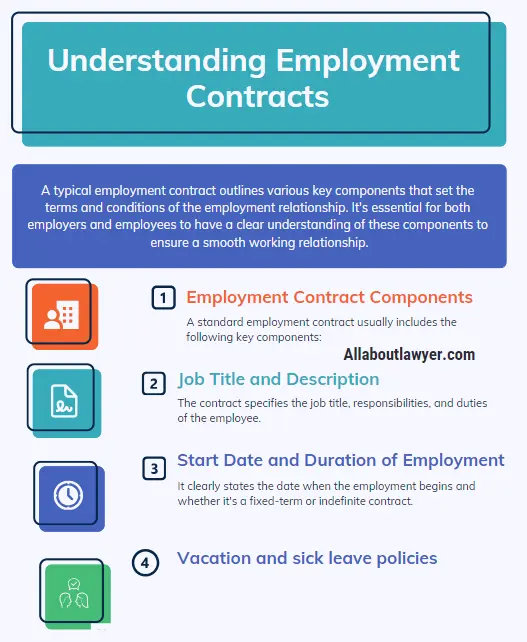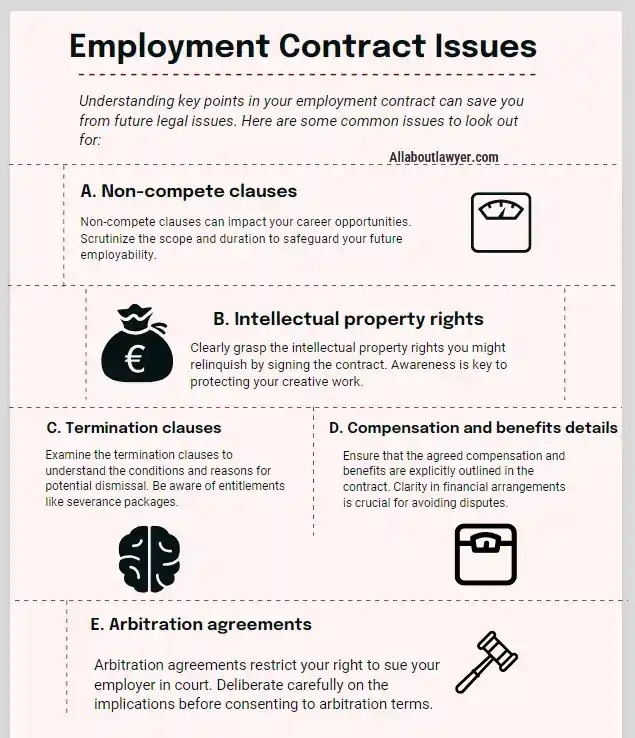Should I Have a Lawyer Review My Employment Contract?
Employment contracts are legally binding agreements that define the relationship between an employer and employee. These documents outline the terms and conditions of employment, including responsibilities, compensation, benefits, and other crucial aspects of the job. Given their importance in shaping your professional life, it’s essential to fully understand and carefully consider every aspect of an employment contract before signing. So it’s necessary to know that Should I have a lawyer review my employment contract or not.
Table of Contents
Why legal review might be necessary
While many people sign employment contracts without seeking legal advice, having a lawyer review your contract can provide valuable insights and protection. A legal review can help you understand complex terms, identify potential issues, and ensure that your rights and interests are adequately protected.
Understanding Employment Contracts
A. Key components of a typical employment contract
1. Job title and description
2. Start date and duration of employment
3. Compensation and benefits

4. Work hours and location
5. Probationary period (if applicable)
6. Vacation and sick leave policies
7. Termination clauses
B. Common clauses and their implications
1. Non-compete agreements
2. Confidentiality clauses
3. Intellectual property rights
4. Dispute resolution procedures
5. At-will employment statements
C. Industry-specific contract elements
Different industries may have unique contractual elements. For example, tech companies often include detailed IP clauses, while sales positions might have complex commission structures.
Reasons Why Should a Lawyer Review Your Employment Contract
A. Protecting your rights and interests
A lawyer can ensure that the contract doesn’t unduly restrict your future career options or unfairly favor the employer.
B. Identifying unfair or illegal clauses
Some contract terms may be unenforceable or even illegal. Legal review can spot these issues before you agree to them.
C. Ensuring clarity and understanding
Legal jargon can be confusing. A lawyer can explain complex terms in plain language, ensuring you fully understand your obligations and rights.
D. Negotiating better terms
With legal insights, you may be able to negotiate more favorable terms, potentially improving your compensation, benefits, or working conditions.
What a Lawyer Can Provide in Contract Review
A. Legal expertise and interpretation
Lawyers can provide context on how courts have interpreted similar contract language in the past.
B. Identification of potential issues
They can highlight clauses that could be problematic in the future, such as overly broad non-compete agreements.
C. Explanation of complex terms
Legal professionals can break down complicated legal language into understandable concepts.
D. Suggestions for modifications
Based on their experience, lawyers can suggest alterations to the contract that could better protect your interests.
Common Issues Found in Employment Contracts
A. Non-compete clauses
These can limit your future job prospects and should be carefully reviewed for scope and duration.
B. Intellectual property rights
Ensure you understand what IP you might be giving up by signing the contract.
C. Termination clauses
Review how and why your employment can be terminated, and what benefits or severance you might be entitled to.
D. Compensation and benefits details
Make sure all promised compensation is clearly outlined in the contract.
E. Arbitration agreements
These can limit your ability to sue your employer in court and should be carefully considered.

When Legal Review is Particularly Important
A. High-level executive positions
These contracts often involve complex compensation packages and significant responsibilities.
B. Specialized industries
Certain fields, like technology or healthcare, may have industry-specific clauses that require expert review.
C. Contracts with unusual terms
If anything in the contract seems out of the ordinary, it’s worth getting a professional opinion.
D. International employment agreements
These can involve complex legal and tax implications that require specialized knowledge.
The Process of Legal Review Of Employment Contract
A. What to expect when working with a lawyer
Typically, you’ll provide the contract, discuss your concerns, and receive a detailed analysis and recommendations.
B. Timeframe for review
Most employment contract reviews can be completed within a few days to a week, depending on complexity.
C. Potential outcomes and next steps
Based on the review, you might proceed to sign, request changes, or even reconsider the offer.
Costs Associated with Legal Review
A. Typical fee structures
Lawyers may charge a flat fee for contract review or bill by the hour. Costs can vary widely based on experience and location.
B. Factors affecting cost
The complexity of the contract, the lawyer’s expertise, and your location can all impact the cost.
C. Cost-benefit analysis
Consider the potential long-term value of the review against the upfront cost.
Related Articles For You:
What Kind of Lawyer Do You Need to Sue a Contractor?
Intellectual Property Breach-of-Contract Attorneys
Alternatives to Full Legal Review Of Employment Contract
A. Online legal services
Some websites offer more affordable contract review services, though they may be less comprehensive.
B. Contract review software
AI-powered tools can flag potential issues, but may miss nuances a human lawyer would catch.
C. HR department assistance
Your company’s HR team may be able to explain terms, but remember they represent the employer’s interests.
D. Limitations of these alternatives
While these options can be helpful, they may not provide the same level of protection and insight as a dedicated legal review.
Potential Risks of Not Seeking Legal Review
A. Unfavorable terms you might miss
Without legal expertise, you might overlook clauses that could negatively impact your future.
B. Long-term career implications
Certain clauses, like non-competes, could limit your career options for years to come.
C. Financial risks
Unclear compensation terms or unfavorable termination clauses could cost you money in the long run.
D. Legal disputes and their costs
If you end up in a dispute with your employer, not understanding your contract could put you at a disadvantage.
How to Prepare for Legal Review Of Employment Contract
A. Gathering all relevant documents
Collect the contract and any related documents or communications about the job offer.
B. Listing your concerns and questions
Prepare a list of specific issues you want the lawyer to address.
C. Understanding your industry standards
Research typical contract terms in your field to have a baseline for comparison.
D. Setting clear goals for the review
Decide what you hope to achieve from the legal review.
Negotiating Contract Changes
A. How a lawyer can assist in negotiations
They can advise on which terms are typically negotiable and help craft counter-proposals.
B. Common negotiation strategies
Understanding when to push for changes and when to compromise is key.
C. Knowing when to compromise
Not every term is worth fighting over; a lawyer can help prioritize your negotiation points.
After the Review: Making Your Decision
A. Evaluating the lawyer’s feedback
Consider the lawyer’s advice in the context of your career goals and personal circumstances.
B. Weighing pros and cons
Balance the contract’s terms against the overall opportunity.
C. Deciding whether to sign, negotiate, or walk away
Based on the review and your priorities, make an informed decision about how to proceed.
Conclusion
A. Recap of the importance of legal review
Legal review can provide crucial insights and protections when considering an employment contract.
B. Empowering yourself through informed decision-making
Understanding your contract fully allows you to make the best decision for your career.
C. Long-term benefits of understanding your contract
A clear understanding of your employment terms can prevent future disputes and ensure a smoother employment relationship.
FAQs
A. How much does it typically cost to have a lawyer review an employment contract?
Costs can range from a few hundred to several thousand dollars, depending on the contract’s complexity and the lawyer’s experience.
B. Can I negotiate my contract after I’ve already signed it?
While possible, it’s much more challenging. It’s best to negotiate before signing.
C. What if my employer won’t allow me time for legal review?
This could be a red flag. Most reputable employers will allow reasonable time for review.
D. Are there any red flags I should look for in an employment contract?
Watch for overly broad non-compete clauses, unclear compensation terms, and mandatory arbitration agreements.
E. How often should I have my employment contract reviewed?
It’s wise to have your contract reviewed whenever significant changes are made, or if you’re considering a job change.
Visit All About Lawyer for more such articles.
About the Author

Sarah Klein, JD, is a former civil litigation attorney with over a decade of experience in contract disputes, small claims, and neighbor conflicts. At All About Lawyer, she writes clear, practical guides to help people understand their civil legal rights and confidently handle everyday legal issues.
Read more about Sarah
About the Author

Sarah Klein, JD, is a former employment attorney who has advised clients on wrongful termination, workplace discrimination, wage disputes, and employee rights. At All About Lawyer, she writes practical, legally sound guides to help workers understand labor laws and stand up for fair treatment at work.
Read more about Sarah
